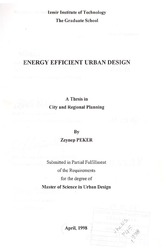Please use this identifier to cite or link to this item:
https://hdl.handle.net/11147/3869| Title: | Energy efficient urban design | Authors: | Peker, Zeynep | Advisors: | Serim, Muharrem Erkal | Publisher: | Izmir Institute of Technology | Abstract: | My personal interest to the term "sustainability" comes up with the close examination of the concept of energy efficiency and the clear threats to our environment let me to make an intensive study on the subject.The aims of this thesis are; to define the problems urban energy consumption causes; to indicate the necessity of reducing this energy consumption; to indicate the importance of planning and urban design to achieve energy efficiency and conservation; to describe energy efficient urban design; to identify energy efficient urban design process and its variables in a convergent manner; and to provide a detailed theoretical supply to serve for further study on this subject.The theoretical knowledge given in the thesis is based upon a wide, intense and ranged literature survey. On the other hand, the pragmatic approach which is built on the combination of the theoretical pieces with a close look at Izmir example is based on the description of the influences of climate, built environment and development and planning process on energy consumption and energy conservation status of Izmir. With respect to the climatic data and development pattern of Izmir, it can be said that any attempt to provide energy efficiency should contain reduction of energy consumption both in cooling and heating however the priority differs according to the properties of the site and microclimate. Central areas of the city, due to the existence of heat island, experience overheating, lacking- of ventilation .. In these areas cooling bas priority_ Therefore it is required to reduce the heat island effect and the energy used for cooling. On the other hand, new development areas, for instance north growth axis of Izmir, have lower air temperatures because of being not completely developed. Therefore, it is required reductions in energy use for heating. Also in order to prevent the formation of heat island and to provide thermal comfort, it is required cooling strategies In summer.Energy conservation and efficiency concepts are not common in our planning apd design practice. However, energy efficiency must be achieved through a complementary tJrban planning and design process. The concept should be adopted into master plans and regulations should promote energy conservation. | Description: | Thesis (Master)--Izmir Institute of Technology, City and Regional Planning, Izmir, 1998 Includes bibliographical references (leaves: 190-194) Text in English; Abstract: Turkish and English xiv, 222 leaves |
URI: | http://hdl.handle.net/11147/3869 |
| Appears in Collections: | Master Degree / Yüksek Lisans Tezleri Sürdürülebilir Yeşil Kampüs Koleksiyonu / Sustainable Green Campus Collection |
Files in This Item:
| File | Description | Size | Format | |
|---|---|---|---|---|
| T000310.PDF | MasterThesis | 72.74 MB | Adobe PDF |  View/Open |
CORE Recommender
Items in GCRIS Repository are protected by copyright, with all rights reserved, unless otherwise indicated.